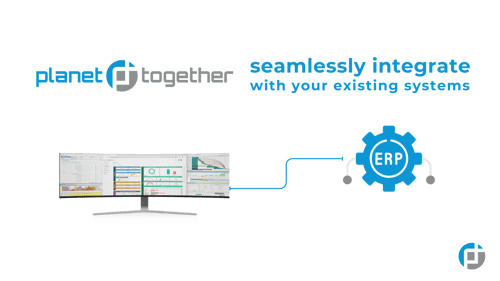The Value Shift: A New Era for Purchasing Managers in Industrial Manufacturing
In industrial manufacturing, cost pressures are constant, raw material prices are volatile, and global supply chains remain unpredictable. For Purchasing Managers, the traditional role of securing the lowest possible cost is no longer sufficient. Success now depends on shifting the mindset from cost cutting to value creation—a strategy that not only protects the bottom line but also enhances agility, supplier collaboration, and operational resilience.
This evolution isn’t just philosophical; it’s operational. It’s about using smarter tools, deeper analytics, and real-time data to make purchasing a strategic driver of profitability and innovation. And at the core of this transformation is the integration of advanced planning systems like PlanetTogether with enterprise platforms like SAP, Oracle, Microsoft Dynamics, Kinaxis, or Aveva.
Let’s explore how this integration empowers Purchasing Managers to move beyond price wars and begin creating tangible, sustainable value for their organizations.

The Shifting Landscape of Industrial Purchasing
Historically, purchasing was evaluated primarily on unit price reductions, with performance measured by how well a buyer could negotiate cost down. But industrial manufacturing has evolved into a high-mix, low-volume environment. Unplanned downtime, supplier inconsistency, and logistical delays can easily erode any gains made through traditional cost-cutting.
The modern Purchasing Manager must now focus on:
Total Cost of Ownership (TCO)
Supplier reliability and flexibility
Inventory optimization
Risk mitigation
Sustainability goals
This broader perspective demands a real-time understanding of demand forecasts, production plans, inventory positions, and supplier performance metrics—something only possible when procurement processes are connected and synchronized with production planning systems.

Moving from Reactive to Proactive: The Role of PlanetTogether
Enter PlanetTogether Advanced Planning and Scheduling (APS). As an intelligent scheduling engine, PlanetTogether brings advanced optimization capabilities to the shop floor, enabling manufacturing teams to respond quickly to fluctuations in demand, material availability, and machine capacity.
When PlanetTogether is integrated with ERP platforms like SAP, Oracle, Microsoft Dynamics, Kinaxis, or Aveva, Purchasing Managers gain a holistic, real-time view of the supply chain. This shift from disconnected systems to a unified planning ecosystem allows purchasing to become more strategic, collaborative, and proactive.

Five Ways Integration Transforms Purchasing from a Cost Center to a Value Generator
Smarter Procurement Through Demand Synchronization
One of the greatest challenges in purchasing is buying too much or too little, often driven by outdated or inaccurate demand forecasts.
By integrating PlanetTogether with an ERP like SAP or Oracle, procurement teams receive real-time, forward-looking demand signals that reflect the latest production schedules, inventory levels, and customer orders. This level of insight allows Purchasing Managers to:
Minimize excess inventory and associated holding costs
Avoid production delays caused by material shortages
Collaborate with suppliers to align delivery schedules with actual needs
Value creation: Reduce working capital and improve on-time delivery through accurate, just-in-time purchasing.
Lead Time Optimization and Supplier Performance Management
Integrated planning platforms provide vendor scorecards and historical performance data that help procurement teams evaluate suppliers beyond price—considering metrics like lead time accuracy, defect rates, and responsiveness.
When this data is pulled directly from a planning platform like PlanetTogether and reflected in ERP dashboards, Purchasing Managers can:
Prioritize reliable suppliers for critical components
Negotiate better terms based on real performance
Shift from reactive firefighting to long-term relationship building
Value creation: Enhance operational continuity and reduce total cost of failure from unreliable sourcing.
Collaborative Planning with Suppliers
With advanced scheduling data from PlanetTogether accessible through ERP portals (such as Microsoft Dynamics or Kinaxis), Purchasing Managers can share production forecasts and capacity plans directly with suppliers.
This transparency enables more strategic supplier collaboration:
Vendors can align their production and logistics with your needs
Joint planning sessions become data-driven and productive
Early warning systems flag potential bottlenecks or material constraints
Value creation: Build resilient, responsive supplier ecosystems that can adapt alongside your operations.
Scenario Planning and Cost Simulation
One of the most powerful features of integrated planning tools is the ability to run “what-if” scenarios. Purchasing Managers can assess the impact of different supplier selections, transportation modes, or sourcing geographies on overall production efficiency and cost.
For example, a scenario might show that a slightly more expensive local supplier enables faster delivery and reduces the need for buffer inventory—actually lowering overall costs.
With PlanetTogether’s optimization engine and integration into Aveva or Oracle, purchasing decisions can be evaluated not just on price, but on their total impact across production, logistics, and fulfillment.
Value creation: Make smarter sourcing decisions that support agility and total operational excellence.
Sustainability and Compliance Integration
Sustainability has become a board-level priority in industrial manufacturing. Whether it’s reducing CO₂ emissions, ensuring ethical sourcing, or complying with regulatory frameworks, procurement plays a central role.
By aligning sourcing plans with PlanetTogether’s scheduling logic, and feeding this data into systems like SAP or Microsoft, Purchasing Managers can:
Select suppliers based on ESG performance
Track the carbon footprint of materials and transportation
Ensure compliance with local and global regulations
Value creation: Align procurement with corporate sustainability goals and avoid penalties or reputational risks.
Making Integration Happen: Best Practices
To realize the full benefits of this integration, organizations should:
Break Down Silos: Foster collaboration between procurement, planning, and IT to align on goals and data structures.
Start Small: Begin with high-impact materials or product lines, then scale integration gradually.
Ensure Data Integrity: Standardize master data across platforms to avoid misalignment between planning and ERP systems.
Invest in Change Management: Train procurement teams to interpret and act on the new insights coming from integrated systems.
Measure Value: Track KPIs such as inventory turns, supplier lead time variance, cost savings from avoidance, and on-time production rates.
As industrial manufacturing continues to digitize and globalize, the role of Purchasing Managers is transforming. No longer limited to tactical buying, modern procurement teams are emerging as strategic enablers of value—unlocking efficiency, resilience, and innovation across the supply chain.
The integration of PlanetTogether APS with enterprise systems like SAP, Oracle, Microsoft Dynamics, Kinaxis, and Aveva serves as the foundation of this evolution. It arms Purchasing Managers with the real-time insights, advanced analytics, and collaborative tools needed to make smarter decisions—not just to cut costs, but to create lasting value.
From cost cutter to value creator—this is the future of purchasing in industrial manufacturing. Are you ready to take your manufacturing operations to the next level? Contact us today to learn more about how PlanetTogether can help you achieve your goals and drive success in your industry.
Topics: Industrial Manufacturing, PlanetTogether Software, Integrating PlanetTogether, Lead Time Optimization, Collaborative Planning with Suppliers, Real-Time Data for Smarter Procurement, Scenario Planning and Cost Simulation, Sustainability and Compliance Integration





















LEAVE A COMMENT